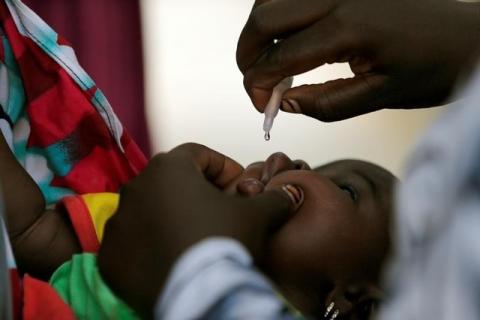Advertisement
Polio vaccine campaign targets 100 million African children to stop Nigeria outbreak spreading
DAKAR (Reuters) - Health workers are preparing to vaccinate more than 116 million children against polio across West and Central Africa in a drive to contain an outbreak of the disease in conflict-hit northeast Nigeria.
Vaccination teams are aiming to reach every child under five in 13 countries from Mauritania to the Democratic Republic of Congo, the Global Polio Eradication Initiative (GPEI) said on Friday.
Fighting between jihadist group Boko Haram and the Nigerian army has caused mass displacement, raising fears the polio outbreak could spread across borders and throughout the region.
After two years in which polio appeared beaten in Africa, Nigeria reported four cases in August, casting a shadow over global eradication hopes, and driving the GPEI to launch one of the largest synchronized vaccination campaigns on the continent.
"The goal is to ensure polio has nowhere to hide," GPEI director Michel Zaffran told the Thomson Reuters Foundation.
"We won't reach every child - we are hoping for at least 90 percent coverage - but we will vaccinate as many as possible to ensure that the virus cannot circulate in any given community."
The polio virus, which invades the nervous system and can cause irreversible paralysis within hours, spreads rapidly among children, especially in unsanitary conditions in war-torn regions, refugee camps and areas where healthcare is limited.
Health experts estimate that for every case of polio that paralyses its victim, 200 silent infections go undetected.
Some 190,000 polio vaccinators will travel house-to-house in villages, towns and cities across the 13 countries, carrying the polio vaccines in ice-filled bags to ensure they do not spoil.
The vaccination teams will reach children on the move by targeting bus and train stations, toll plazas, and country borders, said Rotary International, which is part of the GPEI.
Town criers, local guides, community leaders and radio stations have been engaged to spread the word about the campaign and educate people about its importance, according to Carol Pandak, director of Rotary International's polio program.
"Through our successes in countries like India ... we have learned valuable lessons about how to minimise the risk of missing children," said Pandak, who described the polio outbreak in Nigeria as a regional public health emergency.
The GPEI, launched in 1988, originally aimed to end all polio transmission by 2000. While there has been a 99.9 percent reduction in cases worldwide since the GPEI launch, fighting the last 0.1 percent of polio has been far tougher than expected.
In Pakistan and Afghanistan, the last two countries where polio remains endemic, 33 cases were reported last year. Before these latest infections, Nigeria's last case was in July 2014.
(Reporting By Kieran Guilbert, Editing by Astrid Zweynert)



















Add new comment